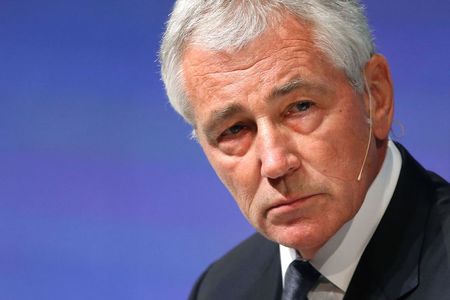By David Alexander
FORT CAMPBELL Ky. (Reuters) - Defense Secretary Chuck Hagel sought on Monday to reassure soldiers training for the fight against Ebola in Liberia that their mission was a legitimate use of the military and the Pentagon was taking every step to ensure their safety.
Hagel watched members of the 101st Airborne Division as they practiced safely taking off protective clothing that could be needed if they were to come into contact with people who had contracted the disease, a scenario officials said was unlikely.
The Pentagon chief also had a private lunch with military wives and told them the department wanted to address concerns they had about the mission, a change for soldiers who have been in combat missions in Iraq or Afghanistan in recent years.
Soldiers acknowledged being apprehensive about the deployment because the threats of disease were different from those of combat. They also were concerned about whether they would be able to communicate with family members back home.
Hagel said one military wife told him that she and her husband were both worried when they learned he was going to work on the Ebola mission.
"After the training," Hagel said, "he came home and said, 'I'm confident that I'm going to be OK.' In fact, he said to her, 'I think this may be the healthiest deployment I've ever had anywhere.'"
Sergeant Matthew Bartlett, a 31-year-old electronics maintenance specialist who served two deployments in Iraq and one in Afghanistan, said he and his family had been "nervous, apprehensive" about the Liberia mission. But he said it would probably be less stressful than previous assignments.
"There's no one shooting back at you," he said.
Hagel told soldiers it was reasonable to ask why the U.S. military should be involved in the Ebola fight.
"It is in our interest ... to do everything we can to assist and contain Ebola so it doesn't get to the United States," he said. He added that no other institution had the logistics and airlift capacity to do the mission.
The U.S. military has some 2,200 troops in Liberia, a number expected to grow to nearly 3,000 by the end of December. They are mainly engineers and workers constructing up to 17 Ebola treatment facilities and staffing mobile testing laboratories.

Hagel told the troops the work already completed by their fellow soldiers was producing "positive trends with Ebola in West Africa."
(Editing by Ken Wills)
